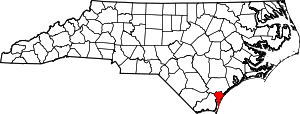Cape Fear Academy
Cape Fear Academy is a private, coeducational PK3–12 school in Wilmington, North Carolina that was established in July 1968 as a segregation academy.[1][2] It was named for the original Cape Fear Academy, an independent school for boys in Wilmington that operated from 1868 until 1916. The present school's first class graduated in 1971.
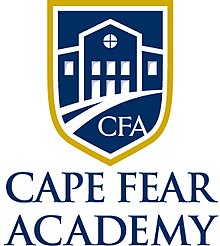
| Cape Fear Academy | |
|---|---|
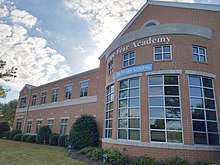 | |
| Location | |
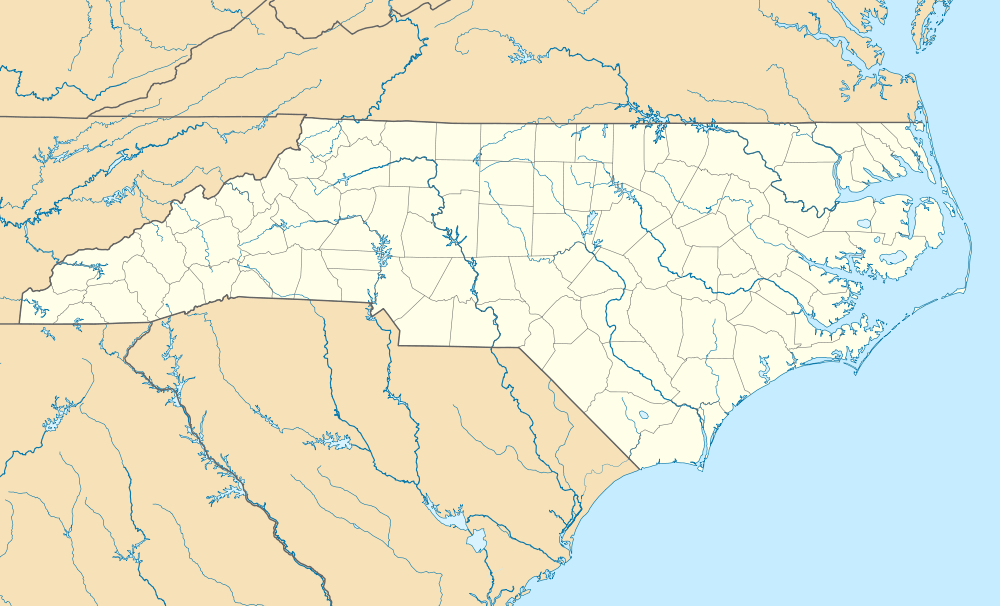 Cape Fear Academy  Cape Fear Academy | |
3900 S College Road , 28412 United States | |
| Coordinates | 34°10′14″N 77°53′36″W |
| Information | |
| Type | Private |
| Founded | 1968 |
| CEEB code | 344347 |
| Headmaster | Donald S. Berger |
| Campus size | 27 acres (11 ha) |
| Color(s) | Blue and gold |
| Athletics | NCISAA |
| Mascot | Hurricanes |
| Website | www |
| Last updated: December 7, 2017 | |
History
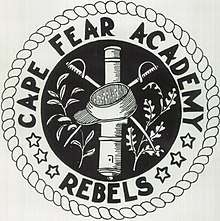
The school was founded as a segregation academy in response to the court ordered integration of public schools. In 1967, the civil rights activist Lee Shelton claimed that Ku Klux Klan was raising funds to establish Cape Fear Academy as a private school for white students.[1][3][4][5]
In 2005, the student body voted to change the school's athletic's team name from The Rebels to The Hurricanes.[6]
Facilities
In the present enrollment model, there is one Prekindergarten (ages 3.5 to 5) of 18 students, and Kindergarten through Grade 5 classes have two sections of 20 students each. Middle School (grades 6–8) and Upper School (grades 9–12) academic sections are composed of no more than 25 students, with up to 75 students enrolled in each of those grades. Cape Fear Academy has had a stable enrollment; 93% of its students re-enrolled after the 2009–2010 school year.
The school is situated on a twenty-seven acres (11 ha) campus. Present facilities include two classroom buildings, a gymnasium with six classrooms, and the Beane-Wright Student Center, as well as athletic fields and a tennis facility. Additionally, athletic fields, including a synthetic-turf field and the John B. Meehl Field House are located across from the campus entrance on College Road on a nine acres (3.6 ha) tract.
Accreditation
Cape Fear Academy is accredited by the Southern Association of Colleges and Schools and also by the Southern Association of Independent Schools. The school is also an active member of the National Association of Independent Schools, the Southern Association of Independent Schools, the North Carolina Association of Independent Schools, the Educational Records Bureau, the Independent School Management Consortium, and the College Entrance Examination Board. Cape Fear Academy offers two types of financial aid: need-based and merit. Approximately 18% of the student body receives some type of financial aid, with the bulk of the awards benefiting students in the Middle and Upper School.
Student Activities
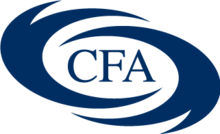
Beginning in seventh grade, students may participate in interscholastic athletics. Approximately 89% of the Middle School students play at least one sport during their tenure. In Upper School, about 93% of the student body plays on at least one team and 60% participate in two or more sports. The athletic program makes it possible for all students to have an opportunity in at least one sport per season.
Upper School has an extensive list of clubs for students ranging from the Beta Club and the Diversity Club to the Surfing Club. Students are encouraged to create clubs where there are groups of interest and a faculty sponsor.
The Upper School has theater program. Approximately 30% of the student body participates in drama as performers or in technology support. Drama presentations include a range of original and well-known pieces from Shakespeare to musical theater. Performances are held on campus, as well as in local community venues, such as Thalian Hall.
The Upper School has an active student-government association, which includes a branch devoted to community service. Students in Upper School must complete 72 hours of service. One of the student-government vice presidents is charged with facilitating this part of student life. A student judicial council makes recommendations for disciplinary infractions.
Notable alumni
- Patrick Ballantine – North Carolina state senator and gubernatorial candidate[7][8]
- Reginald Shuford – ACLU attorney, first black student to graduate[9][7][8]
- Maddie Hasson – actress on ABC Family's Twisted[7]
External links
References
- Eaton, Hubert Arthur (1984). Every Man Should Try. Bonaparte Press. p. 94.
[Lee Shelton] declared that the Klan was raising funds to establish a private school, Cape Fear Academy, for white students
- Godwin, John L (2000). Black Wilmington and the North Carolina way: portrait of a community in the era of civil rights protest. Lanham, Maryland: University Press of America. p. 206. ISBN 0761816828. OCLC 43648608.
The reopening of Cape Fear Academy showed the extent to which wealthier white citizens of the locality sought, through private education, to retain the conservativism of the bygone days of the nineteenth century
- "KKK Accused of Interfering with Head Start". Asheville Citizen Times. June 8, 1967. p. 13 – via Newspapers.com.
Lee Shelton ... said klansman are engaged in raising funds for a private school for white pupils in that section to be called Cape Fear Academy
- "Klue Klux Klan Responsible for Cut of Funds". Kingsport Times. June 6, 1967. p. 21 – via Newspapers.com.
Lee A Shelton said ... the KKK was so strong in New Hanover county that it is now even raising funds to start an all-white private school to be called Cape Fear Academy
- "Klan accused in cut of head start fund". The Atlanta Constitution. June 8, 1967. p. 3 – via Newspapers.com.
[Lee Shelton] said klan influence is strong in New Hanover and that klansmen there are now engaged in raising funds to establish a private school for white students which will be called Cape Fear Academy.
- Bellamy, Cammie (August 25, 2016). "Cape Fear Academy celebrates 50 years in Wilmington". Wilmington Star News.
- "Welcome to Wrightsville Beach Magazine". www.wrightsvillebeachmagazine.com. Retrieved 2017-12-01.
- Baumgartner, Frank R.; Epp, Derek A.; Shoub, Kelsey (2018). Suspect Citizens: What 20 Million Traffic Stops Tell Us About Policing and Race. Cambridge University Press. p. 39. ISBN 9781108688826.
- Shuford, Reggie (2017-05-29). "My graduation from a "segregation academy"". Reggie Shuford. Retrieved 2017-11-03.
